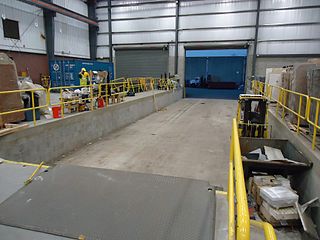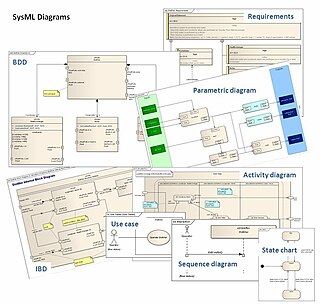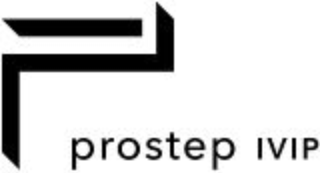
Logistics is the part of supply chain management that deals with the efficient forward and reverse flow of goods, services, and related information from the point of origin to the point of consumption according to the needs of customers. Logistics management is a component that holds the supply chain together. The resources managed in logistics may include tangible goods such as materials, equipment, and supplies, as well as food and other consumable items.

Business process modeling (BPM) is the action of capturing and representing processes of an enterprise, so that the current business processes may be analyzed, applied securely and consistently, improved, and automated.

The Department of Defense Architecture Framework (DoDAF) is an architecture framework for the United States Department of Defense (DoD) that provides visualization infrastructure for specific stakeholders concerns through viewpoints organized by various views. These views are artifacts for visualizing, understanding, and assimilating the broad scope and complexities of an architecture description through tabular, structural, behavioral, ontological, pictorial, temporal, graphical, probabilistic, or alternative conceptual means. The current release is DoDAF 2.02.
The Storage Management Initiative Specification, commonly called SMI-S, is a computer data storage management standard developed and maintained by the Storage Networking Industry Association (SNIA). It has also been ratified as an ISO standard. SMI-S is based upon the Common Information Model and the Web-Based Enterprise Management standards defined by the Distributed Management Task Force, which define management functionality via HTTP. The most recent approved version of SMI-S is available on the SNIA website.
A United States defense standard, often called a military standard, "MIL-STD", "MIL-SPEC", or (informally) "MilSpecs", is used to help achieve standardization objectives by the U.S. Department of Defense.
Integrated logistics support (ILS) is a technology in the system engineering to lower a product life cycle cost and decrease demand for logistics by the maintenance system optimization to ease the product support. Although originally developed for military purposes, it is also widely used in commercial customer service organisations.
The British Ministry of Defence Architecture Framework (MODAF) was an architecture framework which defined a standardised way of conducting enterprise architecture, originally developed by the UK Ministry of Defence. It has since been replaced with the NATO Architecture Framework.
S1000D is an international specification for the procurement and production of technical publications. It is an XML specification for preparing, managing, and publishing technical information for a product. It was initially developed by the AeroSpace and Defence Industries Association of Europe (ASD) for use with military aircraft. Since Issue the scope has been extended to include land, sea and even non-equipment products. It is widely used in civil as well as military products. S1000D is part of the S-Series of ILS specifications.

The systems modeling language (SysML) is a general-purpose modeling language for systems engineering applications. It supports the specification, analysis, design, verification and validation of a broad range of systems and systems-of-systems.
International standards in the ISO/IEC 19770 family of standards for IT asset management address both the processes and technology for managing software assets and related IT assets. Broadly speaking, the standard family belongs to the set of Software Asset Management standards and is integrated with other Management System Standards.
Logistics Support Analysis (LSA) is a structured approach to increase efficiency of maintenance and reduces the cost of providing support by preplanning all aspects of Integrated Logistics Support. A successful LSA will define those support requirements that are ideal for the system design.
A Common Source Data Base (CSDB) is to provide the user with automated processes to handle the complete palette of CSDB objects. Technical documentation is used in many areas of the everyday life. Product liability and many other issues regarding consumer protection have to be covered inside technical documentation. At minimum, a drawing including a few locators has to be provided. Much of this information is in accordance with the international S1000D specification.

The European Cooperation for Space Standardization (ECSS) is a collaboration between the European Space Agency (ESA), the European space industry represented by Eurospace, and several space agencies, to develop and maintain a coherent, single set of user-friendly standards for use in all European space activities. Established in 1993 following a call by Eurospace to unify space products assurance standardization on a European level, it was officially adopted by the ESA on 23 June 1994 through the resolution ESA/C/CXIII/Res.1, to replace its own Procedures, Specifications and Standards (PSS) system. The ECSS currently has 139 active standards, forming the ECSS system. These standards cover management, engineering, product assurance, and space sustainability disciplines. The ECSS is managed by the ESA Requirement and Standard Division, based in the European Space Research and Technology Centre (ESTEC) in Noordwijk, the Netherlands. The ECSS maintains connections with multiple European and international standardization organizations, to contribute to standardization and to adopt relevant standards as part of the ECSS system.
A specification often refers to a set of documented requirements to be satisfied by a material, design, product, or service. A specification is often a type of technical standard.
ISO 26262, titled "Road vehicles – Functional safety", is an international standard for functional safety of electrical and/or electronic systems that are installed in serial production road vehicles, defined by the International Organization for Standardization (ISO) in 2011, and revised in 2018.
Tool management is needed in metalworking so that the information regarding the tools on hand can be uniformly organized and integrated. The information is stored in a database and is registered and applied using tool management. Tool data management consists of specific data fields, graphics and parameters that are essential in production, as opposed to managing general production equipment.

Sparx Systems Enterprise Architect is a visual modeling and design tool based on the OMG UML. The platform supports: the design and construction of software systems; modeling business processes; and modeling industry based domains. It is used by businesses and organizations to not only model the architecture of their systems, but to process the implementation of these models across the full application development life-cycle.
The S-Series of ILS specifications is a common denominator for a set of specifications associated to different integrated logistics support aspects. Originally developed by AECMA, the S-Series suite of ILS specifications is managed currently jointly by multinational teams from the AeroSpace and Defence Industries Association of Europe (ASD) and Aerospace Industries Association (AIA) reporting to the AIA/ASD ILS Council. The ILS Council established the term S-Series (of) ILS specifications as the common denominator for all its specifications, and this term was consolidated with the publication of SX000i.
S4000P - International specification for developing and continuously improving preventive maintenance is a specification developed jointly by a multinational team from the Aerospace and Defence Industries Association of Europe (ASD) and Aerospace Industries Association (AIA). S4000P is part of the S-Series of ILS specifications and is integrated in the global ILS process defined by SX000i - International guide for the use of the S-Series of Integrated Logistics Support (ILS) specifications.

pr is an association with its headquarters in Darmstadt, Germany. Founded in 1993 as the ProSTEP Association for the Promotion of Product Data Standards and later renamed to ProSTEP iViP Association in 2002, and since May 2017 the association's name has been written as "prostep ivip". Prostep ivip is a globally active, independent association of 180 member companies from industry, IT and research. It is an industry-driven association and its main focuses are on the digital transformation in product creation and production. By designing digital transformation in the manufacturing industry prostep ivip defines and aggregates the requirements of manufacturers and suppliers, intending to define standards and interfaces primarily for the digitalization of the entire product creation process – from idea to implementation.






